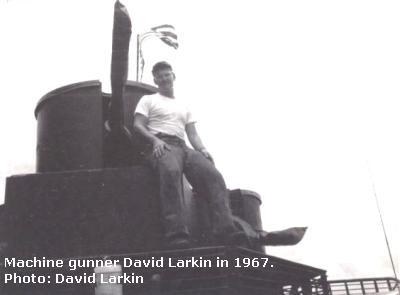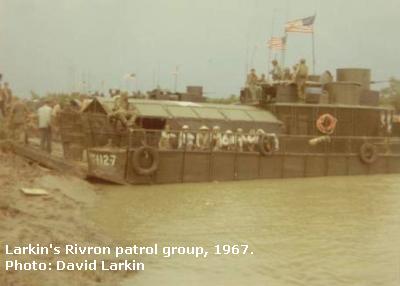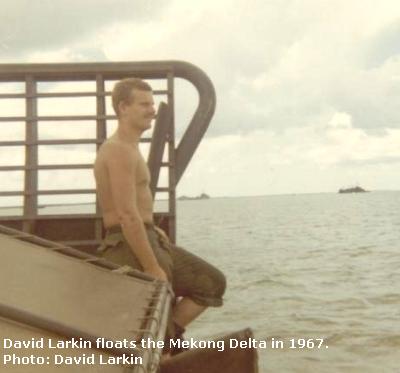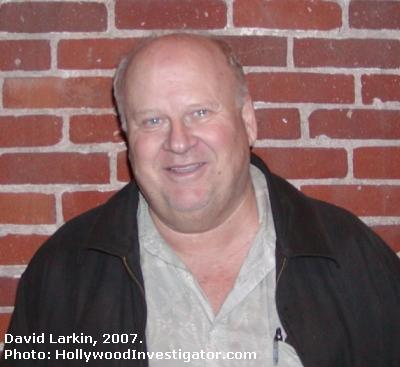VIETNAM COMBAT VET TURNS
LIBERTARIAN PEACE ACTIVIST
by Thomas M. Sipos, managing editor.
[December 8, 2007]
 [HollywoodInvestigator.com]
David Larkin is known to California Libertarians
for his activism, most recently serving two years as Los
Angeles County LP Chair (2004 - 06). His activism encompasses
many libertarian issues that he's studied over the years. But when
it comes to his antiwar activism, Larkin speaks from experience -- he'd
fought in Vietnam. A war for which he volunteered. [HollywoodInvestigator.com]
David Larkin is known to California Libertarians
for his activism, most recently serving two years as Los
Angeles County LP Chair (2004 - 06). His activism encompasses
many libertarian issues that he's studied over the years. But when
it comes to his antiwar activism, Larkin speaks from experience -- he'd
fought in Vietnam. A war for which he volunteered.
Larkin joined the U.S. Navy
Reserve in 1964 while still in high school. In 1966 he became active
duty and worked in the USS Okanogan's boiler room. "The worst job on the ship," said Larkin. "One of our chiefs came
up to me and said, 'They're looking for volunteers for Vietnam, you wanna
go?' I said, 'Can I think about it?' He said, 'Yeah, I'll give
you 30 seconds.' So I said, 'I'll go.' I figured anything was
better than working in the boiler room."
After
additional training, Larkin was flown to Vietnam in April 1967. Thirty-six
hours flying time from San Diego to Saigon on a four-engine propeller plane. He landed at Tansanute Air Force Base and was assigned to a naval patrol
on the Mekong Delta and Saigon River. One of seven men in his boat's
crew.
"We
were Rivron 111-1," said Larkin. "Part of the transports. Drop
troops off, pick them up. Provide fire if needed. Generally,
in the Navy you have two jobs. A regular job -- I worked as
an engineman. And your general quarters job -- I was a machine gunner
on general quarters. I had a 50 caliber machine gun and an automatic
grenade launcher.
 "There were other types
of boats in our group. A kind of patrol boat, not for carrying troops,
just for fighting. Another like a battleship. Over time, the
Navy
developed lots of different weapons, because the VC would fire at you from
these hardened bunkers. They were like adobe, made of clay, sunbaked. Even a 50 caliber round wouldn't penetrate one of those things. "There were other types
of boats in our group. A kind of patrol boat, not for carrying troops,
just for fighting. Another like a battleship. Over time, the
Navy
developed lots of different weapons, because the VC would fire at you from
these hardened bunkers. They were like adobe, made of clay, sunbaked. Even a 50 caliber round wouldn't penetrate one of those things.
"We had the same problem
they have now in Iraq. They'd ambush you from the side and shoot
rockets, RPGs. We had a lot of armor. They made the boat wider to
accommodate the extra weight, for buoyancy. But RPGs can penetrate
armor plate like a hot knife through butter. Our armor was about
3/4 of an inch thick. It'd stop a heavy bullet, 50 caliber, but not these
RPGs. It's called a shape charge. They detonate against the armor
and blow a hole through it. If you're on the other side, too bad
for you."
Seeking a solution, the crew
welded rebar to the boat. "The RPGs would hit these outside bars
first and detonate," said Larkin. "This widens the blast, so it's
not
concentrated, and the armor can stop it. Well, that's how it worked
in theory. But it still detonated the armor, and guys were
killed."
 Larkin recounts being under
enemy fire. "One night we were cruising up the channel. I was
cockswain, on the wheel driving the boat. All of a sudden a rocket
shot across and hit the boat ahead of us. Boom! Stuff
flying everywhere. Larkin recounts being under
enemy fire. "One night we were cruising up the channel. I was
cockswain, on the wheel driving the boat. All of a sudden a rocket
shot across and hit the boat ahead of us. Boom! Stuff
flying everywhere.
"Well, the armor saved them, nobody got hurt. But I didn't want to cross the line of fire, so I threw the engines in
reverse. I heard rockets go whoosh, exploding. Two or
three more fired. Maybe they were shooting at us but they missed. Had it hit the armor where I was, there wasn't any rebar. It'd have
wiped me out. We lost one guy like that. One of those things hit,
turned him into jello on the inside.
"I kind of saw the futility
of it all. How we treated the Vietnamese, not really good. I remember
a fisherman. We took him off his boat. He didn't get tortured,
but we took him for questioning. We brought him back at the end of
the day. Well, the boats leak. They have to constantly bail
them. When we came back, his boat was under water. He was madder
than a wet hen. I thought to myself, if he wasn't a Vietcong before,
he probably is now.
"I saw a lot of incidents
like that. We wanted to get the people on our side. Instead
we infuriated them half the time. Not that we didn't do good deeds. We'd throw them our C-rations and stuff like that. We tried to help
them when we could.
"It's kind of how libertarians
see the government. An elephant in a china shop. They may have
the
intention of doing well, but they just manage, with their brute force,
to screw things up."
 in 1967_.jpg) Larkin returned to the U.S.
in October 1967 with a Navy commendation medal bearing a combat V. "I was still in favor of the war, because this was before I became a libertarian. But I began to have questions about it. I don't know what the medal
was for. Burglars stole it last year. I still have the citation
for it." Larkin returned to the U.S.
in October 1967 with a Navy commendation medal bearing a combat V. "I was still in favor of the war, because this was before I became a libertarian. But I began to have questions about it. I don't know what the medal
was for. Burglars stole it last year. I still have the citation
for it."
A former Republican, Larkin
shifted toward libertarianism in the 1980s. "What really got me interested
was their position on the war on drugs. It made sense. I think
I joined the party in '89. I'd been going to meetings and somebody
says, 'Why don't you become an officer?' So I said, 'Oh, okay.'
"When the Gulf War came,
I was not antiwar, because I identified with our troops. But later
I saw that a lot of the information and justification for the war was spin,
and not necessarily true." Larkin has since continued his political
education, and has opposed the recent wars in the Balkans and the Mideast. He can't understand why any libertarian would feel otherwise.
 "What really shocked me was
libertarians agreeing with the government's use of torture. I've
had some libertarians say, 'These are bad people, torture's okay in this
case,' forgetting everything the party stands for. Everything that
liberty and freedom are about. "What really shocked me was
libertarians agreeing with the government's use of torture. I've
had some libertarians say, 'These are bad people, torture's okay in this
case,' forgetting everything the party stands for. Everything that
liberty and freedom are about.
"Plus, this war's costing
us a fortune. It's devastating our economy. We're spending
so much on this military that is not redeemable. That's not doing
anything for us. The average citizen, I don't believe, benefits from
this stuff. They maybe say, it's protecting him, but I don't think
so. It's just making the risk of [future] war very high.
"Democrats waste a lot of
money,
but at least it's spent here, on stupid social projects. Those are
preferable to war.
"Being libertarians, being
against the war on drugs, you know what the government is like. You
know
how they spin. How could they be so bad in everything else and good
about this war?"
Copyright 2007 by HollywoodInvestigator.com.

|
